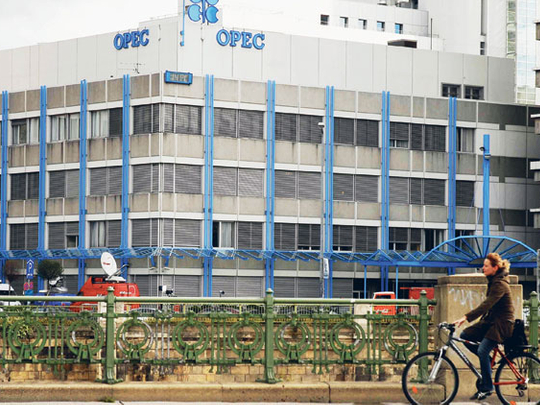
London: Opec is facing growing calls to boost oil production as crude prices in Asia and Africa surpass $100 (Dh367.8) a barrel for the first time in two years.
Nigeria's Bonny Light grade, from which traders gauge the cost of West African oil, rose to $100.12 a barrel on January 17, passing $100 for the first time since October 2008, according to data compiled by Bloomberg. Malaysia's Tapis and Indonesia's Minas breached that level a week ago, trading at $103.36 and $103.21, respectively yesterday.
The International Energy Agency (IEA), an adviser to consuming nations, said on January 18 that "three-digit oil prices risk damaging" the economic recovery, signalling that the Organisation of Petroleum Exporting Countries (Opec) should raise output. Opec responded the same day by saying that global supplies are sufficient to meet demand.
With "some Asian crudes well above $100 a barrel, the risks of Opec acting must be higher," said Lawrence Eagles, New York-based head of oil research at JPMorgan Chase and Company.
"We would not be surprised to see the public rhetoric from consuming countries accelerate in the coming weeks. Behind the scenes pressure will no doubt be mounting in parallel."
Investors should "pare risk and take some profits" on the possibility that Opec unexpectedly increases production, Eagles said in a report on Thursday. "There is a rising risk of coming into the office one Monday morning to find Opec has raised output dramatically."
Oil producers as well as consumers may suffer if crude stays at about $95 to $100 a barrel, the Paris-based IEA said. Stockpiles held by companies in the most developed economies were at 2.742 billion barrels, "near the top of their five-year range," it said.
Opec, responsible for 40 per cent of global supply, issued a statement on its website saying "there is more than enough oil on the market," and promised action in the event of a supply shortage. The group is next due to review production quotas in June, skipping its usual first-quarter conference.
"Any assumption that there is tightness in the market is incorrect," Opec Secretary-General Abdullah Al Badri said in the statement. "In reality, commercial stocks remain well above the five-year average and forward cover stands at around 60 days. There is more than enough oil on the market."
Crude snapped a three-day decline to rise 40 cents, or 0.5 per cent, to $89.99 a barrel in electronic trading on the New York Mercantile Exchange as of 12.26pm London time, bringing its gain from a year ago to 18 per cent.
Brent futures, which price two-thirds of the world's oil, climbed 63 cents, or 0.7 per cent, to $97.21 a barrel, for an advance of 30 per cent in the past year. Brent reached a 27-month high of $99.20 on January 14.
African and Asian oil grades trade at a premium because of lower sulphur content and higher gasoline and jet fuel yields.
Profit beats estimates
Google Inc said fourth-quarter profit topped analysts' estimates as optimism about the economy led companies to boost spending for online advertising. Net income rose 29 per cent to $2.54 billion (Dh9.34 billion), or $7.81 a share, from $1.97 billion, or $6.13, a year earlier, Google said on its website. Profit excluding some items was $8.75 a share, exceeding the $8.08 average of estimates compiled by Bloomberg.












